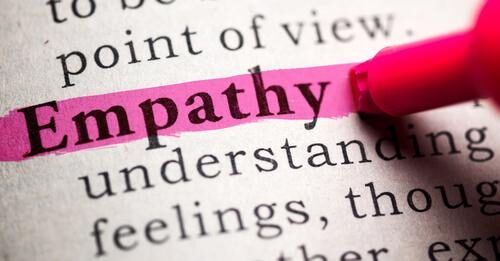5 STRATEGIES FOR SHOWING EMPATHY

If you’ve recently seen the news, you might have the impression that the world is unkind and unforgiving. It’s tempting to believe that human compassion and connection have completely vanished when you combine that with growing divisions caused by social media, which puts us all just a click away from one another while keeping us all in different time zones.
We haven’t forgotten how to show empathy – but with all that’s going on in the world, we may need a reminder.
Empathy is the ability to understand others’ feelings and show compassion toward them. It’s different from sympathy, although both involve emotions. Showing empathy is more than saying something nice or sending a card when something bad happens to someone. Think of sympathy as feeling sorry for someone, while empathy means feeling sorry with them. You can vividly imagine the other person’s experiences and emotions.
Empathetic responses are especially powerful because they involve three parts of the brain working together: the emotional part understands others’ feelings; the cognitive part is able to understand what they are thinking; and the somatic part causes you to physically feel what they are feeling. You feel empathy not just in your mind, but in your heart and soul.

Empathy is an essential part of emotional intelligence, or the ability to build relationships – and in life, relationships are everything. You can have all the money and power in the world, but you’ll never feel fulfilled without love and connection, two of our deepest human needs. Learning how to show empathy will help you nurture the relationships that are such a necessary part of the human experience.
Empathy can help you excel in business by building trust, creating lasting networking bonds and making you a better leader. It will help you create passionate relationships and even make you a better friend. Most of all, unlocking how to be empathetic makes the world a better, more compassionate and more forgiving place. We could all use more compassion in our lives.
Showing empathy is a vital part of what makes us human. It comes more naturally to some people than others, based on the wiring of our brains and how we were raised, but anyone can learn how to be empathetic – and reap the benefits.
1. LISTEN
A friend has come to you with terrible news. What do you do? It’s natural to want to fix the things that are hurting our loved ones – but chances are they just need you to listen. Deep listening is a life skill that will serve you well, whether you want to deepen your bonds with your partner, work on your leadership or build rapport with others. Using eye contact, being fully present and giving nonverbal feedback are important keys to how to be empathetic.

2. CHANGE YOUR WORDS
It’s tempting to respond to bad news with cliches like “Everything happens for a reason” or “It’s a blessing in disguise.” Yet in reality, these responses aren’t helpful – and can even diminish how the other person feels. Change your words to acknowledge their pain with phrases like “That sounds hard” or “I’m sorry you’re going through this.” Don’t offer solutions or advice unless you’re asked. Showing empathy often means saying nothing at all.
3. KEEP THE FOCUS ON THEM
When we want to relate to someone, we often fall back on using “I” statements and relating similar things that have happened to us. While this type of communication has its place in relationships, it isn’t necessary to showing empathy. Talking about yourself can have the opposite effect – causing the other person to shut down. Remember, where focus goes, energy flows. Keep the energy flowing in the right direction by keeping the focus off yourself.
4. UNDERSTAND THEIR NEEDS
While everyone has heard the saying “walk a mile in their shoes,” in order to properly demonstrate empathy, you must comprehend their point of view. Instead of dismissing someone or giving in to your negative feelings, keep in mind the six human needs that guide all of our judgments. They are likely not receiving at least one of the following needs: clarity, significance, variety, love/connection, growth, and contribution. You’ll master sympathetic reactions after you figure out how to address their demands.

5. FIND COMMON VALUES
We all hold many values and convictions, such as those related to commitment, integrity, optimism, and creativity. But there are also universal human values that most people, regardless of their ethnicity, age, or culture, share. Even when we are unable to relate to another person’s specific experience, these values enable us to understand their emotions. We can all relate to the anguish of losing a loved one, the suffering that relationships may bring, or the worry over failing in our jobs or personal lives. Learn to be sympathetic by using these universal experiences.




